|
|
|
Sort Order |
|
|
|
Items / Page
|
|
|
|
|
|
|
| Srl | Item |
| 1 |
ID:
136599


|
|
|
|
|
| Summary/Abstract |
The frequent and repeated large-scale attacks on the Gaza Strip have had a blunting effect, with the oft-cited statistics and casualty tolls failing to convey the suffering and trauma entailed by the relentless violence perpetrated on the Palestinian population. In this reflection, Laila El-Haddad interweaves personal stories about families and LOVED ones into her essay about the summer 2014 assault on her home of origin. She humanizes her subjects and focuses on their day-to-day experiences rather than on the enumeration of the damage, destruction, and devastation wrought. She reminds her readers that in spite of being beleaguered and besieged, Gazans are not beaten down and are resorting to art and other forms of creative expression to memorialize the dead, the displaced, and the wounded, and to remind the world of their humanity.
|
|
|
|
|
|
|
|
|
|
|
|
|
|
|
|
| 2 |
ID:
136593


|
|
|
|
|
| Summary/Abstract |
During the summer of 2014, the U.S. government once again offered the State of Israel unwavering support for its aggression against the Palestinian people. Among the U.S. public, however, there was growing disenchantment with Israel. The information explosion on social media has provided the public globally with much greater access to the Palestinian narrative unfiltered by the Israeli lens. In the United States, this has translated into a growing political split on the question of Palestine between a more diverse and engaged younger population and an older generation reared on the long-standing tropes of Israel’s discourse. Drawing analogies between this paradigm shift and the turning point in the civil rights movement enshrined in Mississippi’s 1964 Freedom Summer, author and scholar Robin Kelley goes on to ask whether the outrage of the summer of 2014 can be galvanized to transform official U.S. policy.
|
|
|
|
|
|
|
|
|
|
|
|
|
|
|
|
| 3 |
ID:
135778


|
|
|
|
|
| Summary/Abstract |
According to the current Local Authorities Act in Israel 2000, once the municipal government fails to function financially, the Ministry of the Interior should intervene to appoint a professional team to help the municipality recover from its crisis. This law contains no wording ordering the local authorities to provide any local services. In the absence of a clear demand from the central government to provide certain public goods at the local level, what motivates the heads of local authorities to provide such goods? Given that local environmental issues are mostly identified as local services, and that people's satisfaction with the quality of the local environmental services is an effective predictor for the re-election of an incumbent head in almost all Israeli municipalities, the way local authorities deal with these services constitutes a case study with which to examine their incentive for providing local services. This study seeks to explain the empirical nature of the major political motivations of the heads of local authorities for providing environmental services. The environmental and sustainability literature offers economic and civic motivations as an answer to this question. In contrast, this article suggests public choice theory as an alternative answer to this question.
|
|
|
|
|
|
|
|
|
|
|
|
|
|
|
|
| 4 |
ID:
136597


|
|
|
|
|
| Summary/Abstract |
Without explicitly referencing the so-called Dahiya doctrine, Israel accompanied its summer 2014 onslaught against Gaza with a formidable media campaign of vilification and dehumanization, which enabled it to prosecute Operation Protective Edge with minimal criticism. Despite repeatedly violating the norms of international law, Israel portrayed itself as facing a near-existential threat from Palestinians who, in turn, were characterized as irrational actors and blamed for their own deaths. Israel’s discursive dominance resulted from the failure of an official Palestinian media strategy and from the news media’s reticence to question Israel’s actions or challenge its narrative.
|
|
|
|
|
|
|
|
|
|
|
|
|
|
|
|
| 5 |
ID:
137058


|
|
|
|
|
| Summary/Abstract |
In this previously unpublished interview, James R. Clapper, Jr., the current Director of National Intelligence (DNI) in the United States, discusses his experiences as spymaster leading an Intelligence Community widely viewed as organizationally decentralized and criticized in the past for failing to work together harmoniously. Director Clapper argues that the Community has become much more structurally integrated, and that the Office of the DNI (ODNI) provides an opportunity for leadership that is more effective than outside critics have acknowledged. I conducted this interview in August 2014 at his office near Tyson's Corner in North Arlington, Virginia. It was a time of rising unrest in the world, with elite Russian troops carrying out forays across the border into Ukraine, a Middle East terrorist faction known as ISIS gathering momentum in a march from Syria toward Baghdad, and with recurring violence that continued to plague the relationship between the Hamas faction in Palestine and the state of Israel
|
|
|
|
|
|
|
|
|
|
|
|
|
|
|
|
| 6 |
ID:
136598
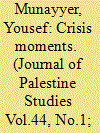

|
|
|
|
|
| Summary/Abstract |
Discourse and public opinion on the question of Palestine—and every other issue for that matter—are largely shaped by themainstreammedia. Palestine remains remote for the average American consumer of information who is generally less concerned with foreign affairs than with the domestic issues that directly impact daily life. In moments of crisis, however, media coverage of Palestine increases significantly, sometimes to the point of saturation. Such “crisis moments,” despite being few and far between, can have a significant and lasting impact on shaping public opinion, rendering it critically important to understand and analyze the coverage of Israel’s latest assault on Gaza—as well as the discourse surrounding the issue.
|
|
|
|
|
|
|
|
|
|
|
|
|
|
|
|
| 7 |
ID:
136657


|
|
|
|
|
| Summary/Abstract |
India, the IT nation, did not make a news splash at CyberTech 2014. That is worth a passing thought. Because cyber is the fifth and new domain of warfare, after land, sea, air and space.
CyberTech 2014 took place in Tel Aviv in January, and displayed Israel’s prowess in cyber-defence. Israel’s National Cyber Bureau, which played a major role in organising the event, defines its goals as drawing up cyber-defence policies, developing cybersecurity legislation and turning Israel into a global cyber incubator. The Israelis say that as hackers keep getting more sophisticated, the brightest digital security minds from around the world will need to come together. And CyberTech 2014 did do that, bringing together some 500 heads of industry, representatives of cybersecurity agencies from across the world, as well as a large US delegation from the White House and their Department of Homeland Security. Many agreed that Israel’s experience in foiling thousands of cyber-attacks each day and the quality of their cyber start-ups could be very lucrative for business within and outside its
|
|
|
|
|
|
|
|
|
|
|
|
|
|
|
|
| 8 |
ID:
136591
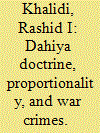

|
|
|
|
|
| Summary/Abstract |
IN JULY 2014, Israel launched its third and most massive military assault in a period of less than six years on the 1.8 million people of the Gaza Strip. In so doing, it killed over twenty-one hundred Palestinians and wounded more than eleven thousand. The vast majority of the thirteen thousand casualties were civilians, and well over half of them were women, children, old people, and the disabled. This latest massacre of the innocents provides the occasion for the Journal of Palestine Studies (JPS) to offer a special dossier centered on Gaza.
|
|
|
|
|
|
|
|
|
|
|
|
|
|
|
|
| 9 |
ID:
136099
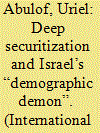

|
|
|
|
|
| Summary/Abstract |
Securitization theory's core contention—the social construction of security as a “speech–act”—is perceptive and productive, yet insufficiently attentive to societies engulfed in profound existential uncertainty about their own survival. Such societies are immersed in what I call “deep securitization,” whereby widespread public discourses explicitly frame threats as probable, protracted, and endangering the very existence of the nation/state. Under deep securitization, to politicize is to securitize, sectors intensely intertwine, political legitimacy's object is the polity/identity itself, and securitization steps are typically nonbinary and nonlinear. Empirically, if some securitizations are deeper than others, Israel's is one of the deepest. In this study, I examine this exceptionally apt, though little-examined, case for securitization theory. Israeli public discourse abounds with “existential threats,” invariably depicting the Jewish people and polity as endangered. The article analyzes the securitization of demography and its linkage to geography and democracy in the Israeli-Jewish discourse and praxis.
|
|
|
|
|
|
|
|
|
|
|
|
|
|
|
|
| 10 |
ID:
135777


|
|
|
|
|
| Summary/Abstract |
The study of social policy in Israel has undergone major changes both since its initial steps during the 1950s and since the early 1970s, a period in which the first significant efforts to institutionalize it as an academic field took place. Based on a theoretical perspective that regards the scientific system as a social arena, this article seeks to identify the trends that have characterized this development as reflected in journal publications, both Israeli and international, over the past four decades. The findings indicate that social policy research has become a vibrant field of academic research over this period and that a number of key trends related to both the intra-institutional aspects and the intra- scientific aspects of this development, can be identified.
|
|
|
|
|
|
|
|
|
|
|
|
|
|
|
|
| 11 |
ID:
136119
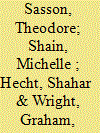

|
|
|
|
|
| Summary/Abstract |
Taglit-Birthright Israel has brought hundreds of thousands of diaspora Jewish young adults on tours of Israel. Drawing on data from a large-scale program evaluation, we ask how the program affects participants’ feelings of homeland attachment and political views on contentious homeland issues. North Americans who traveled to Israel with Taglit between 2010 and 2012 were surveyed together with a comparison group of applicants to the program who did not participate. In multivariate analysis, Taglit sharply increases feelings of connection to Israel but has no effect on attitudes concerning the future of Jewish settlements in the West Bank. The program modestly increases scores on a “favorability” scale and modestly increases opposition to a possible division of Jerusalem in a future peace deal. In contrast to Benedict Anderson's theory of long-distance nationalism, the findings suggest that feelings of homeland connection can be fostered without triggering ethnonationalist attitudes associated with the political right.
|
|
|
|
|
|
|
|
|
|
|
|
|
|
|
|
| 12 |
ID:
137114
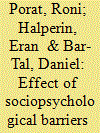

|
|
|
|
|
| Summary/Abstract |
During protracted intractable conflicts, society members develop a sociopsychological infrastructure that leads to selective and biased information processing, obstructing the penetration of new information that may facilitate peacemaking. To validate a process model that depicts the functioning of these barriers, we conducted a study among 207 Israeli Jews, focusing on the effects of long-term barriers on information processing. After measuring these barriers, we introduced an invented peace proposal and gave participants the option of processing additional information concerning its implications using the Decision Board Platform. Aided by this platform, we conducted an in-depth analysis of information acquisition strategies and found that four general worldviews (i.e., traditional and universal values, incremental theory, and authoritarianism) were associated with the ethos of conflict, which in turn was associated with the general amount and type of information processed. The theoretical and applied implications are discussed.
|
|
|
|
|
|
|
|
|
|
|
|
|
|
|
|
| 13 |
ID:
136429


|
|
|
|
|
| Summary/Abstract |
This article describes the rules of origin dispute between the European Union and Israel, and argues that these technical customs rules are also instruments of foreign policy. Although the rules have had no direct impact on Israel's industry in the Occupied Territories, they have bolstered the European Union's self-identification as a “normative power” while constituting an important legal precedent that has served to legitimize other actions against Israel's occupation
|
|
|
|
|
|
|
|
|
|
|
|
|
|
|
|
| 14 |
ID:
135783


|
|
|
|
|
| Summary/Abstract |
The establishment of a multi-campus university in the Galilee would primarily assist the smaller colleges that have relatively small enrolment numbers, and lack the wherewithal to create a critical mass of staff and resources. The proposal fell victim to power struggles between the Planning and Budgets Committee and other branches of the Council of Higher Education. Or perhaps the concept of a ‘university’ stirred anxiety among Council members, most of whom have vested interests in the universities where they work. The fact is that a good plan that would have contributed to higher education in the north and upgraded the region's academic colleges was tossed off the Council's agenda without its advocates being called for a serious discussion.
|
|
|
|
|
|
|
|
|
|
|
|
|
|
|
|
| 15 |
ID:
136629


|
|
|
|
|
| Summary/Abstract |
The latest war in Gaza—from the beginning of July to the end of August 2014—is over, but both Israelis and Palestinians believe it will not be the last one. Israelis believe they must deter Hamas from conducting additional attacks and keep it weak should a conflict occur. This is an approach that more pro-Western Palestinian leaders and Arab states like Saudi Arabia, fearing the political threat Hamas poses, often quietly applaud. For their part, Hamas leaders remain hostile to Israel and feel politically trapped by the extensive blockade of Gaza—and all the while, Gaza lies in ruins. The combination is explosive. Israeli security analyst Yossi Alpher put it succinctly: “It is increasingly clear that the Gaza war that ended in August will soon produce…another Gaza war.”1 The Economist also gloomily predicted that “war will probably begin all over again, sooner or later.”2
|
|
|
|
|
|
|
|
|
|
|
|
|
|
|
|
| 16 |
ID:
136891
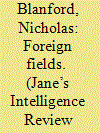

|
|
|
|
|
| Summary/Abstract |
Hizbullah’s operations across Syrian battlefronts continued in early 2015, playing a major role in supporting the governments. Nicholas Blanford examines the group’s involvement in Syria and how its combat experience could be relevant in a future conflict with Israel.
|
|
|
|
|
|
|
|
|
|
|
|
|
|
|
|
| 17 |
ID:
134831


|
|
|
|
|
| Summary/Abstract |
Although resolution of the issues related to fresh water shared by Israel and Palestine will not bring about peace between the two peoples, in the absence of a just resolution of water issues, no peace can be complete. Furthermore. in the absence of sustainable use of water by both peoples, overall social and economic development will be threatened. and so too will peace for the region.
|
|
|
|
|
|
|
|
|
|
|
|
|
|
|
|
| 18 |
ID:
136110


|
|
|
|
|
| Summary/Abstract |
Since the late 1970s Israel has been operating postheroically, with postheroic behavior gradually becoming an integral part of its strategic culture and way of war, and often coming at the expense of mission fulfillment. In the Israeli case, the strongest explanation for such behavior has been the marriage of two factors: Israel's engagement in low-intensity conflicts (LICs), which have not threatened its basic security, let alone its existence, and sophisticated technology, which has played a significant facilitating role in applying postheroic warfare. Sparing the lives of the Israel Defense Forces' (IDF's) own troops and of enemy civilians helped gaining greater domestic and legitimacy, as well as greater sustainability in LICs. On the other hand, living up to postheroic warfare's rules had a price not only in terms of fulfilling the military missions, but also in terms of sensitivity to unexpected, sometimes sudden leaps in casualties and/or collateral damage; the danger of lowering the threshold war; and asymmetry with enemies that do not cooperate with postheroic rules and rather fight heroically. The analysis of the Israeli case covers the LIC events Israel has been engaged in from the 1978 Operation Litani, in which postheroic warfare was detected for the same time, to the more recent 2012 Operation Pillar of Defense.
|
|
|
|
|
|
|
|
|
|
|
|
|
|
|
|
| 19 |
ID:
134625


|
|
|
|
|
| Summary/Abstract |
This article will focus on an ongoing process of Jerusalem’s contested urban space during the last decade namely the immigration of Palestinians, mostly Israeli citizens, to “satellite neighbourhoods”, i.e. Jerusalem’s colonial neighbourhoods that were constructed after 1967. Theoretically, this paper attempts to discuss neighbourhood planning in contested cities within the framework of geopolitics. In more details, we will focus on the relevance of geopolitics to the study of neighbourhood planning, by which we mean not merely a discussion of international relations and conflict or of the roles of military acts and wars in producing space. Rather, geopolitics refers to the emergence of discourses and forces connected with the technologies of control, patterns of internal migrations by individuals and communities, and the flow of cultures and capital.
|
|
|
|
|
|
|
|
|
|
|
|
|
|
|
|
| 20 |
ID:
135781


|
|
|
|
|
| Summary/Abstract |
Electoral institutions and salient ‘issues’ bear significant effects on voting behaviour. One of the most intriguing voting patterns, split voting, is a combination of the two. This article examines the impact of changes in electoral institutions on voting behaviour. Employing the well-known ‘balancing model’ it analyses the impact of multi-issue political context on the generalizability of the model. Israel presents a unique case in which a change in the electoral institution was implemented fully only twice before returning to the old system. The article uses individual-level data collected prior to the two electoral campaigns to analyse the ability of the balancing model to account for the multi-faceted, multi-identity scheme. The findings show that for the most salient issue the model holds; however, when looking at secondary issues and self-identifications of voters the model fails to predict split voting. Finally, the effects of the institutional change on voting patterns are analysed.
|
|
|
|
|
|
|
|
|
|
|
|
|
|
|
|
|
|
|
|
|